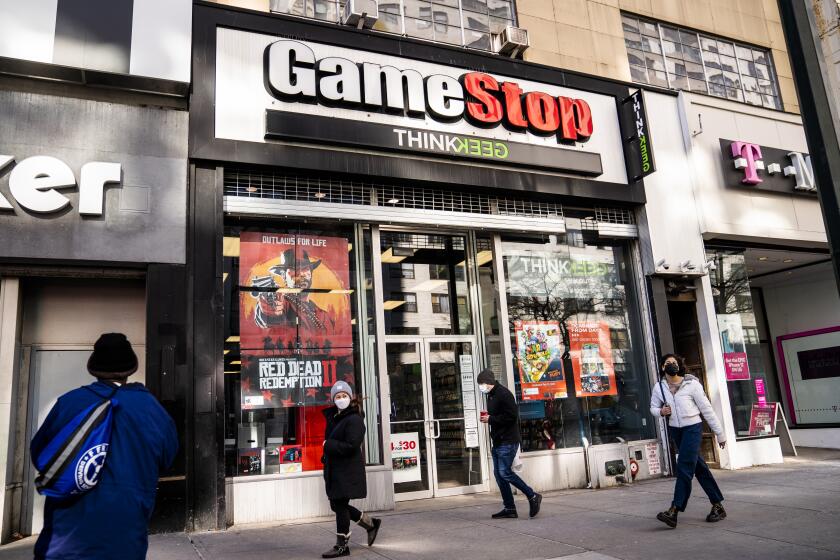Nvidia quietly prepares to abandon $40-billion Arm bid

- Share via
Nvidia Corp. is quietly preparing to abandon its purchase of Arm Ltd. from SoftBank Group Corp. after making little to no progress in winning approval for the $40-billion chip deal, according to people familiar with the matter.
Nvidia has told partners that it doesn’t expect the transaction to close, according to one person, who asked not to be identified because the discussions are private. SoftBank, meanwhile, is stepping up preparations for an Arm initial public offering of stock as an alternative to the Nvidia takeover, another person said.
The purchase — poised to become the biggest semiconductor deal in history when it was announced in September 2020 — has drawn a fierce backlash from regulators and the chip industry, including Arm’s own customers. The U.S. Federal Trade Commission sued to stop the transaction in December, arguing that Nvidia would become too powerful if it gained control over Arm’s chip designs.
The acquisition also faces resistance in China, where authorities are inclined to block the takeover if it wins approvals elsewhere, according to one person. But they don’t expect it to get that far.
Both Nvidia and Arm’s leadership are still pleading their case to regulators, according to the people, and no final decisions have been made. Through it all, the companies have publicly maintained their commitment to the purchase.
“We continue to hold the views expressed in detail in our latest regulatory filings — that this transaction provides an opportunity to accelerate Arm and boost competition and innovation,” Nvidia spokesman Bob Sherbin said.
GameStop’s rocketing price defined the insane stock market of 2021. Now it’s plummeting.
“We remain hopeful that the transaction will be approved,” a SoftBank spokesperson said in an emailed statement.
Nvidia shares fell as much as 5.6% to $220.70 in New York on Tuesday. SoftBank’s U.S. depository shares slid 4.9%.
If Nvidia manages to get the deal over the line, it would be a massive coup for Chief Executive Jensen Huang, who has built a graphics-card business into a chipmaking empire. Already, he’s sitting atop the most valuable U.S. company in the semiconductor industry, with a market capitalization of more than half a trillion dollars.
But it will be an uphill fight. Qualcomm Inc. pulled the plug on its $44-billion takeover of NXP Semiconductors in 2018 after nearly two years of regulatory hurdles.
The sale of Arm is under heavy scrutiny because its chip designs are used in a wide variety of products, including phones, cars and factory equipment, making neutrality the foundation of its business model. The world’s biggest tech companies rely on Arm technology, and they fear they could lose unfettered access under Nvidia.
Tech giants lined up against the takeover. A group including Qualcomm, Microsoft Corp., Intel Corp. and Amazon.com Inc. have provided regulators around the world with what they believe is enough ammunition to kill the deal, according to people familiar with the process. In addition to needing approval in the U.S. and China, the Arm purchase needs clearance from the European Union and the United Kingdom, both of which are studying the deal closely.
The ordeal has created divisions within Nvidia. Some people at the company are resigned to the acquisition’s defeat, but others think management could use the FTC trial to demonstrate the merits of the transaction.
In the end, though, Nvidia will probably be fine without Arm, said Sanford C. Bernstein analyst Stacy Rasgon.
“While owning the asset could have been wonderful, we don’t believe they had to have it either,” he said in a research note. The deal could have helped Nvidia’s push into data-center chips, but the company “presumably can and will” continue their stand-alone efforts, Rasgon said.
Within SoftBank, there are factions that want to let the process play out — especially since a gain in Nvidia’s stock price has made the transaction more valuable. Even after a recent tumble, Nvidia shares have nearly doubled since the Arm deal was announced. That’s added tens of billions of dollars to the initial $40-billion price tag.
Others at SoftBank would prefer to pursue an IPO for Arm sooner, while the chip industry is still considered attractive to investors. Already, concerns about a slowdown are growing.
The initial agreement between Nvidia and SoftBank expires Sept. 13 — two years after it was forged — but could be renewed if a deal is reached. Nvidia said at the outset that closing the transaction would take “approximately 18 months.” That timeline would suggest completion around March of this year — something that’s no longer likely.
The FTC lawsuit alone could take months. And the European Commission and Britain’s antitrust watchdog will have to weigh in.
SoftBank and Arm are entitled to keep the $2 billion that Nvidia paid at signing, including a $1.25-billion breakup fee, regardless of whether the deal goes through.
Nvidia also has to get a sign-off from Chinese authorities at a time when trade tensions are running high. The U.S. has sought to prevent China’s semiconductor industry from getting access to the latest technology. Many of the country’s fledgling chipmakers are Arm customers, giving Beijing extra incentive not to let the technology pass into U.S. ownership.
In arguing against the deal, companies such as Qualcomm, Intel and Google have said that Nvidia can’t preserve Arm’s independence because it’s an Arm customer itself. Nvidia, the largest maker of graphics chips, competes with Intel in server processors and is expanding into new areas that would put it in direct competition with many other Arm licensees.
Nvidia also supplies chips to businesses such as Amazon’s AWS and Microsoft’s Azure, providing technology that handles artificial intelligence processing in data centers. Those companies also are developing their own chips, making Nvidia both a supplier and a potential rival.
— With assistance from Bloomberg writers Dina Bass, David McLaughlin, Ruth David and Dinesh Nair.
More to Read
Inside the business of entertainment
The Wide Shot brings you news, analysis and insights on everything from streaming wars to production — and what it all means for the future.
You may occasionally receive promotional content from the Los Angeles Times.











